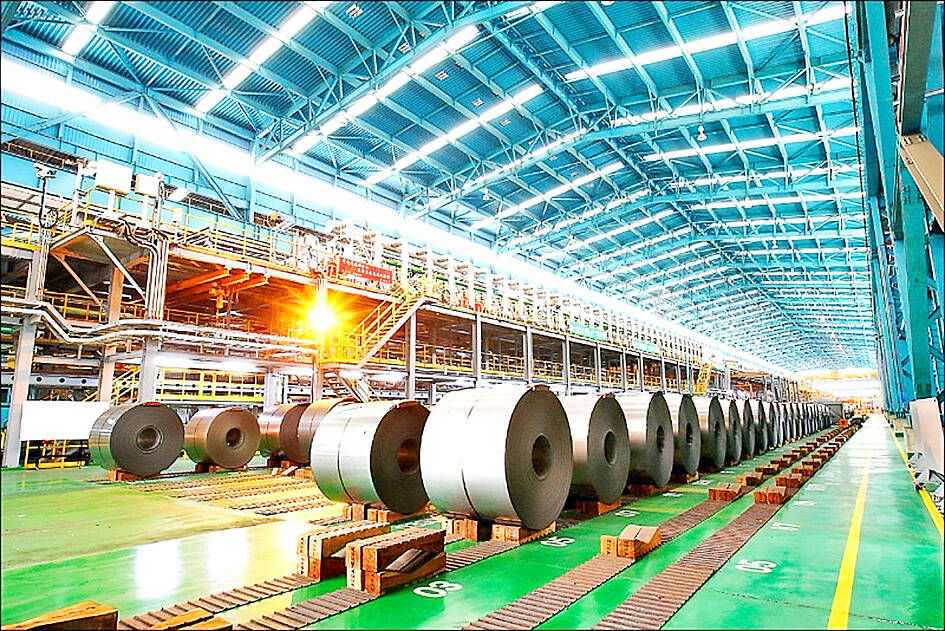China Steel Corp (CSC, 中鋼), Taiwan’s largest integrated steelmaker, on Thursday announced it would keep domestic prices for most products unchanged for next month in a move to hedge against risks in the wake of the US government’s new tariffs.
The move came after US President Donald Trump on Monday last week signed orders to implement a 25 percent tariff on steel and aluminum imports.
Last year, iron and steel products were Taiwan’s fifth-largest exports to the US at US$4.3 billion, according to data provider CEIC.

Photo courtesy of China Steel Corp
“China Steel continues to pay attention to market development as global manufacturing demand is still in a slow recovery phase, while Trump’s trade policy poses great uncertainty,” the company said in a statement.
“In order to assist downstream partners to respond flexibly, China Steel decides to maintain its prices for most products in March and will continue to launch various supporting programs to help customers win orders,” the Kaohsiung-based company said.
For next month’s delivery, the steelmaker only raised the price for its hot-rolled steel coils by NT$300 per tonne, it said.
Prices for other items, including hot-rolled steel plates, cold-rolled steel coils, anti-fingerprint electro-galvanized steel coils, hot-dipped galvanized steel coils and electrical steel coils would remain flat, it said.
The company said it expects a significant improvement in the steel market at the end of this quarter, as the IMF predicts the world economy to grow 3.5 percent this year and Taiwan’s domestic demand has rebounded gradually aided by new technologies such as artificial intelligence.
In addition, iron ore and coal prices remain stable at US$100 to US$110 and US$185 to US$195 per tonne respectively, while China is promoting an industrial transformation in its steel sector, which all lead to a supply-demand balance and support the market going forward, the company said.
On the price front, China’s Baoshan Iron & Steel Co (寶鋼), the country’s largest steelmaker, raised domestic prices of steel plates by 100 yuan (US$13.79) per tonne for delivery next month, while US steel prices have shown an uptrend recently, with Trump’s 25 percent tariffs on all steel imports likely to fuel further price hikes and benefit firms’ profitability, the company said.
On Tuesday last week, China Steel chairman Hwang Chien-chih (黃建智) said Trump’s universal tariffs on all steel imports are expected to place Taiwan-made steel, which already has a 25 percent tariff, on an equal footing, and boost Taiwan’s competitive edge against other countries in the US market.

UNCERTAINTY: Innolux activated a stringent supply chain management mechanism, as it did during the COVID-19 pandemic, to ensure optimal inventory levels for customers Flat-panel display makers AUO Corp (友達) and Innolux Corp (群創) yesterday said that about 12 to 20 percent of their display business is at risk of potential US tariffs and that they would relocate production or shipment destinations to mitigate the levies’ effects. US tariffs would have a direct impact of US$200 million on AUO’s revenue, company chairman Paul Peng (彭雙浪) told reporters on the sidelines of the Touch Taiwan trade show in Taipei yesterday. That would make up about 12 percent of the company’s overall revenue. To cope with the tariff uncertainty, AUO plans to allocate its production to manufacturing facilities in

TAKING STOCK: A Taiwanese cookware firm in Vietnam urged customers to assess inventory or place orders early so shipments can reach the US while tariffs are paused Taiwanese businesses in Vietnam are exploring alternatives after the White House imposed a 46 percent import duty on Vietnamese goods, following US President Donald Trump’s announcement of “reciprocal” tariffs on the US’ trading partners. Lo Shih-liang (羅世良), chairman of Brico Industry Co (裕茂工業), a Taiwanese company that manufactures cast iron cookware and stove components in Vietnam, said that more than 40 percent of his business was tied to the US market, describing the constant US policy shifts as an emotional roller coaster. “I work during the day and stay up all night watching the news. I’ve been following US news until 3am

COLLABORATION: Given Taiwan’s key position in global supply chains, the US firm is discussing strategies with local partners and clients to deal with global uncertainties Advanced Micro Devices Inc (AMD) yesterday said it is meeting with local ecosystem partners, including Taiwan Semiconductor Manufacturing Co (TSMC, 台積電), to discuss strategies, including long-term manufacturing, to navigate uncertainties such as US tariffs, as Taiwan occupies an important position in global supply chains. AMD chief executive officer Lisa Su (蘇姿丰) told reporters that Taiwan is an important part of the chip designer’s ecosystem and she is discussing with partners and customers in Taiwan to forge strong collaborations on different areas during this critical period. AMD has just become the first artificial-intelligence (AI) server chip customer of TSMC to utilize its advanced

Six years ago, LVMH’s billionaire CEO Bernard Arnault and US President Donald Trump cut the blue ribbon on a factory in rural Texas that would make designer handbags for Louis Vuitton, one of the world’s best-known luxury brands. However, since the high-profile opening, the factory has faced a host of problems limiting production, 11 former Louis Vuitton employees said. The site has consistently ranked among the worst-performing for Louis Vuitton globally, “significantly” underperforming other facilities, said three former Louis Vuitton workers and a senior industry source, who cited internal rankings shared with staff. The plant’s problems — which have not